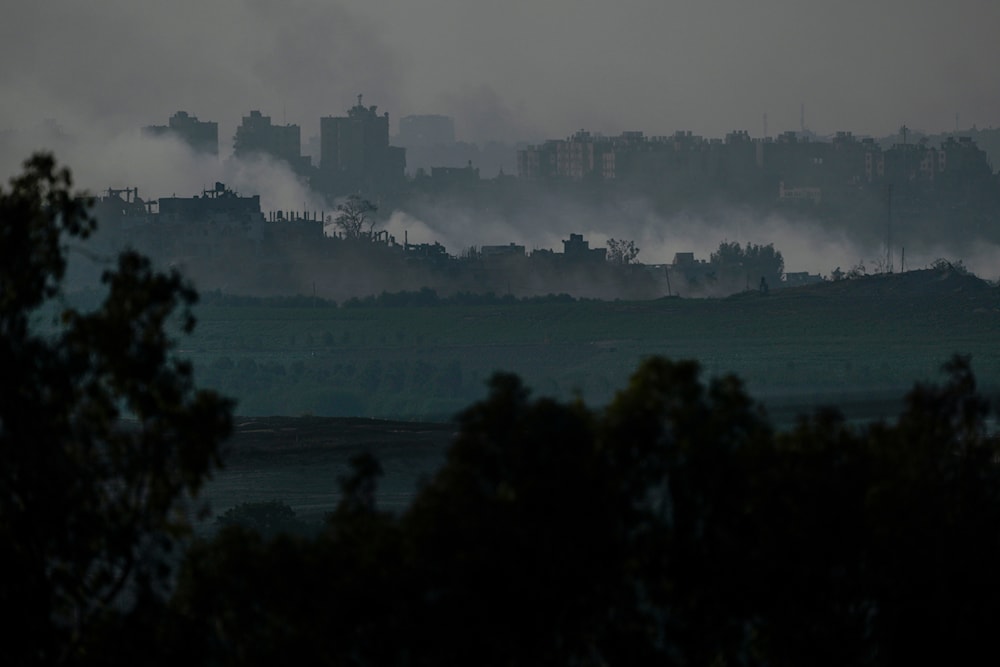'Israel' informs Arab nations it seeks buffer zone in Gaza: Reuters
Reuters revealed that "Israel" informed several Arab nations of its plans after the end of the war on the Gaza Strip.
-

Smoke rises following an Israeli bombardment in the Gaza Strip, as seen from southern "Israel", Thursday, Nov. 2, 2023. (AP)
Reuters revealed on Saturday that "Israel" informed several Arab countries of its desire to establish a buffer zone on the Palestinian side of the Gaza border after the end of the war, citing its wish to "preventing any future attacks".
According to sources, "Israel" has communicated its plans to Egypt and Jordan, as well as the UAE. Additionally, Saudi Arabia, which lacks relations with "Israel" and suspended normalization after October 7 last year, has been informed, along with Turkey.
The sources did not clarify to Reuters how the information reached Riyadh, which officially lacks direct communication channels with "Israel."
A high-ranking regional security official, one of the three sources who requested anonymity regarding their nationalities, stated, "Israel aims to establish this buffer zone between Gaza and Israel, from north to south, to prevent any infiltration or attacks by Hamas or any other militants."
Read next: Arab nations intensifying appeals to US for Gaza ceasefire: NYT
The governments of Egypt, Saudi Arabia, Qatar, and Turkey have not responded to Reuters' requests for comments. Attempts to reach Jordanian officials for comments were unsuccessful.
When directly questioned, no Emirati official responded regarding whether Abu Dhabi was informed about the buffer zone. However, the official stated that the UAE would support any future arrangements agreed upon by all parties concerned to achieve stability and establish a Palestinian state in the post-war period.
Israeli source: The plan is divided into 3 levels
In response to a question about the idea of establishing a buffer zone, the Israeli Prime Minister’s foreign policy advisor, Ophir Falk, stated to Reuters, "The plan is more detailed than that. It's based on a three-tier process for the day after Hamas."
Clarifying the Israeli occupation's stance, he highlighted that the three levels involve dismantling Hamas, disarming Gaza, and eradicating what he referred to as "extremism" in the Strip.
Falk added, "A buffer zone may be part of the demilitarization process," he said. He declined to offer details when asked whether those plans had been raised with international partners, including Arab states."
Arab nations have dismissed the Israeli goal of eliminating Hamas, saying it is impossible and stressing that the Palestinian Resistance is more than just an armed force that can be defeated.
Evacuating the Gaza Strip of its residents
Since the launch of Operation Al-Aqsa Flood, the occupation government hinted at the creation of a buffer zone within Gaza, aiming to evacuate the Strip's residents. However, sources now reveal that the government is presenting the buffer zone plan to Arab countries as a component of its future security strategies for Gaza.
Israeli forces withdrew from the Strip in 2005. An anonymous US official stated that "Israel" proposed the idea of a buffer zone without specifying to whom. However, the official reiterated Washington's opposition to any plan that would diminish the area of Palestinian lands.
Jordan, Egypt, and other Arab countries have voiced concerns over the possibility of "Israel" forcibly displacing Palestinians from Gaza, reminiscent of the occupation of Palestinian land in 1948.
A senior Israeli security source said the buffer zone idea was "being examined", adding, "It is not clear at the moment how deep this will be and whether it could be 1 km or 2 km or hundreds of meters (inside Gaza)."
Any incursion into the Gaza Strip, which is approximately 40 kilometers long and between five and 12 kilometers wide, would result in its population of 2.3 million being confined to a smaller area.
A buffer zone in northern Gaza
Two Egyptian security sources told Reuters that "Israel" presented, during mediation talks with Egypt and Qatar, the idea of disarming northern Gaza and establishing a buffer zone there under international supervision.
The sources reported that several Arab countries were opposed to this, adding that, however, the Arab countries may not oppose the establishment of a security barrier between the two sides, but the dispute remains around the location of the barrier.
Read next: 2-day truce extension reached; same terms as previous deal: Hamas

 4 Min Read
4 Min Read








